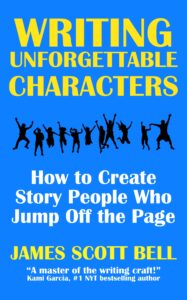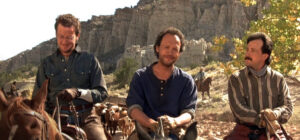by James Scott Bell
@jamesscottbell
Back when I was first learning how to write fiction, I concentrated on plot and structure. These were the parts of the craft that were most mysterious to me. I had no idea how the writers I enjoyed came up with twisting, turning plots that held delightful surprises and satisfying endings. I thought they just sat down and started typing, and therefore had an inner genius I lacked. I’d been told as much in college: “You don’t have any inner genius, Mr. Bell.” Okay, maybe not in those exact words, but it was implied. I was certainly told I couldn’t learn how to write great fiction. You either have it or you don’t, they said.
I apparently didn’t have it. So I went into a much more stable profession—acting. Then I got married (see last week’s post) and decided a steady income was actually a good thing, so I went to law school.
Some years later I saw Moonstruck and had to find out if I could, after all, learn to write.
It took me a year of study to get a handle on structure. During that year I was concentrating on screenwriting. My primary text was Syd Field’s Screenplay. I still remember the joy I felt when I finally started to see what was going on structurally, and then added to the mix my formulation of the “doorways of no return.”
So I wrote a screenplay (my fourth or fifth effort) based on what I learned. An up-and-coming Hollywood agent consented to read it.
I sent it to her.
And vividly remember the phone call. She told me the plot was good, but the script didn’t do it for her, because “the characters don’t jump off the page.”
After retrieving my heart from my shoes, I sat back and thought about her comment. Intuitively, I understood. After all, the movie that re-awakened my desire to write, Moonstruck, is full of characters who “jump off” the screen. Even the minor ones.
That’s what was missing in my screenplays.
So began another course of study to figure out characterization.
As usual, I got some craft books and re-read a few favorite novels with great characters. I studied and practiced and, lo and behold, landed a book contract. After a few years I began teaching workshops and writing my own books on the craft.
 Here’s the new one: Writing Unforgettable Characters: How to Create Story People Who Jump Off the Page. (See below for pre-order info).
Here’s the new one: Writing Unforgettable Characters: How to Create Story People Who Jump Off the Page. (See below for pre-order info).
I’ve included a number of my workshop exercises in the book. One of my favorites is “Best Day, Worst Day.” I got this idea from the hit comedy City Slickers. Remember? Billy Crystal, Daniel Stern and Bruno Kirby play three friends: Mitch, Phil and Ed. They are almost 40 years old and have come to a point where they look at their lives and think, Is this is as good as it’s ever going to get? Mitch is stuck in a job he hates. Phil is stuck in a terrible marriage. And Ed is stuck in a macho image hiding his insecurities.
So the three decide to get away from it all and go out West for a “real” cattle drive. They join with a few other tourists. And then meet the tough trail boss, Curly (Jack Palance, in an Oscar-winning turn).
The superb script (by Lowell Ganz and Babaloo Mandel) is an example of what I call “orchestration.” You cast your characters so they are different enough from each other that conflict can naturally occur. This is especially important for your allies (characters on the same team).
 At one point the three friends are riding along, and Mitch tells about the best day of his life (his father taking him to Yankee Stadium for the first time) and his worst day (the day a lump was found in his wife’s breast). Then:
At one point the three friends are riding along, and Mitch tells about the best day of his life (his father taking him to Yankee Stadium for the first time) and his worst day (the day a lump was found in his wife’s breast). Then:
Phil: All right, I got one. My best day—
Ed: This isn’t the one about Arlene and that loose step, is it?
Phil: No, my wedding day.
Mitch: What!
Phil: Yeah, remember that day? Outdoor wedding. Arlene looked great. Those water pills really worked. You guys were all smiling at me, and my dad, in the front, gives me a little wink, you know? I mean, he’s not the warmest of men, but he winked. I was the first one of us to get married and have a real job and I remember thinking, I’m grown up, you know? I’m not a goofball anymore. I made it. I felt like a man. That was the best day of my life.
Ed: What was your worst day?
Phil: Every day since is a tie.
Then the question is asked of Ed, who at first refuses to answer. But then:
Ed: I’m fourteen and my mother and father are fighting again, you know, because she caught him again. Caught him! This time the girl drove by the house to pick him up. And I finally realized, he wasn’t just cheating on my mother, he was cheating us. So I told him, I said, “You’re bad to us. We don’t love you. I’ll take care of my mother and my sister. We don’t need you anymore.” And he made like he was gonna hit me, but I didn’t budge. And he turned around and he left. Never bothered us again. But I took care of my mother and my sister from that day on. That’s my best day.
Phil: What was your worst day?
Ed: Same day.
That is just flat-out great dialogue. But for our purposes, it is also a fantastic exercise for deepening your characters before you render them on the page. The nice thing is you don’t have to put the material in your novel (though you certainly may). Just knowing it for yourself will automatically give you a better, more complex character. So brainstorm away, be ye plotter or pantser. You’ll be glad you did.
You’ll find more exercises like this in Writing Unforgettable Characters, which you can pre-order here:
A print version will be also be available soon.
Why don’t we play half this game today in the comments? What was one of your best days or favorite memories?
